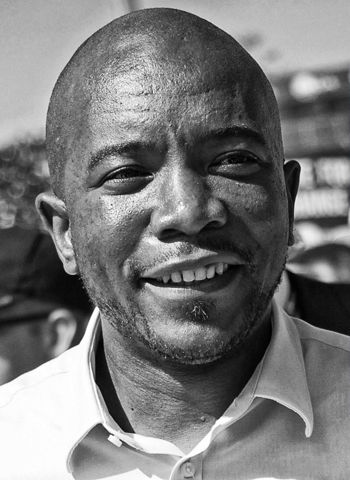Providing a competitive, quality and affordable education that equips every young South African for a future economy must be at the centre of our agenda. This focuses on preparing young people to add value to the marketplace and contribute to the economic and social needs of the country.
Education is the cornerstone of our nation’s prosperity. We envision an educational landscape characterised by affordability, accessibility, and quality from early schooling to tertiary degrees. We have 24,000 schools, with 13 million learners in the system. Our goal is to equip every South African with the skills to earn well, realise their potential, and compete in the digital economy.
However, the government is hellbent on doing the very opposite. I wish to address the newly introduced General Education and Training Certificate (GETC), which will allow learners to exit school at Grade 9, and be recognised within the National Qualifications Framework under skill level 1.
Basic Education Minister, Angie Motshekga, confirmed that the certificate was introduced at 1,000 schools across all nine provinces last year. Let us consider what a skill level 1 is.
Internationally jobs are ranked by skill levels on the International Standard Classification of Occupations (Isco) scale. Skill level is defined as a function of the complexity and range of tasks and duties to be performed in an occupation.
Occupations at Skill Level 1 typically require the performance of
- simple and routine physical or manual tasks;
- require the use of handheld tools, such as shovels, or of simple electrical tools; and/or
- equipment, such as vacuum cleaners.
Moreover, it includes tasks such as cleaning; digging; lifting and carrying materials by hand; sorting, storing or assembling goods by hand (sometimes in the context of mechanised operations); operating non-motorised vehicles; and picking fruit and vegetables.
Occupations classified at Skill Level 1 include office cleaners, freight handlers, garden labourers and kitchen assistants.
Hendrik Verwoerd would have been proud of this certificate. The architect of Bantu Education during apartheid, Verwoerd believed that the African child should not be educated fully because there was no need for a skilled black labour force.
Today, the ANC government is — in effect — determined to mirror this policy. It limits young, mainly black South Africans to either low-skilled jobs or unemployment. Instead, we need to make sure more learners finish matric and do so with high-quality grades and with proficiency in science and mathematics. Going to Tvet colleges without a full grasp of the subject matter from grade 1-9 will not help young people obtain technical qualifications and skills the economy requires.
In addition, it is a sinister attempt by the ANC government to erase its high school dropout problem by issuing a new certificate at the grade 9 stage. South Africa loses half of every learner cohort that enters the school system by the end of the 12-year schooling period. Two out of 10 learners drop out of school after Grade 3, four out of 10 after Grade 9, six out of 10 after Grade 10 and 7.3 out of 10 after Grade 11.
Therefore, this new “Bantu Education Certificate” must be stopped immediately.
We face a critical shortage of skills, and our performance in human skills development is underwhelming. The World Economic Forum’s Global Competitiveness Index ranks South Africa as follows:
- On skills of the current workforce — 101/141;
- On skills of the future workforce — 107/141; and
- On quality of vocational training — 119/141.
We must address this crisis to meet the demands of the evolving job market. And an early exit option out of school for grade 9 learners will not do the trick.
Government should instead be focused on fixing what is broken in our public education system — lack of resources and infrastructure, low standards and a weak curriculum, pit toilets, crowded classrooms, unaccountable and under-equipped teachers, and textbook shortages.
Build One South Africa (Bosa) advocates a school voucher programme that returns the power to decide which school a child goes to back to the learner’s parents. Parents have the most vested interest in the long-term education of their child. Parents care enough to conduct sensible due diligence which will unearth key information related to the performance of nearby schools.
This voucher, estimated at R15,000 per annum (based on the current government cost to educate each child), should be awarded directly to parents who will be given a choice as to whether to use it for payment at a nearby public school or to add some of their own capital to the voucher in order to take their children to a private or semi-private school.
If paired with a radically increased public infrastructure investment programme in public schools that attract more children as a result of the voucher system, bad schools will run out of business while good schools will be enlarged and recapitalised.
In addition, Bosa will work to advocate for pressing issues that include:
- Dropping the 30% pass mark for subjects;
- Introducing an independent education ombudsman;
- Incentivising students during the academic year;
- Implementing tighter security at all schools;
- Expanding extended programmes for underperforming learners;
- Reprioritising budget for digital learning and infrastructure;
- Higher pay for performing teachers;
- A nationwide skills audit for educators; and
- Addressing the disproportionate power trade unions wield over teachers and the functioning of the education system.
These interventions, grounded in accountability, transparency, and excellence, are crucial steps toward rescuing our education system. It is only when we create an environment where every South African child has equitable access to quality education that we pave the way for a prosperous and thriving nation.
In the interests of the 24,000 schools under its supervision and with 13 million learners in the system, this “Bantu Education Certificate” must be scrapped. DM




